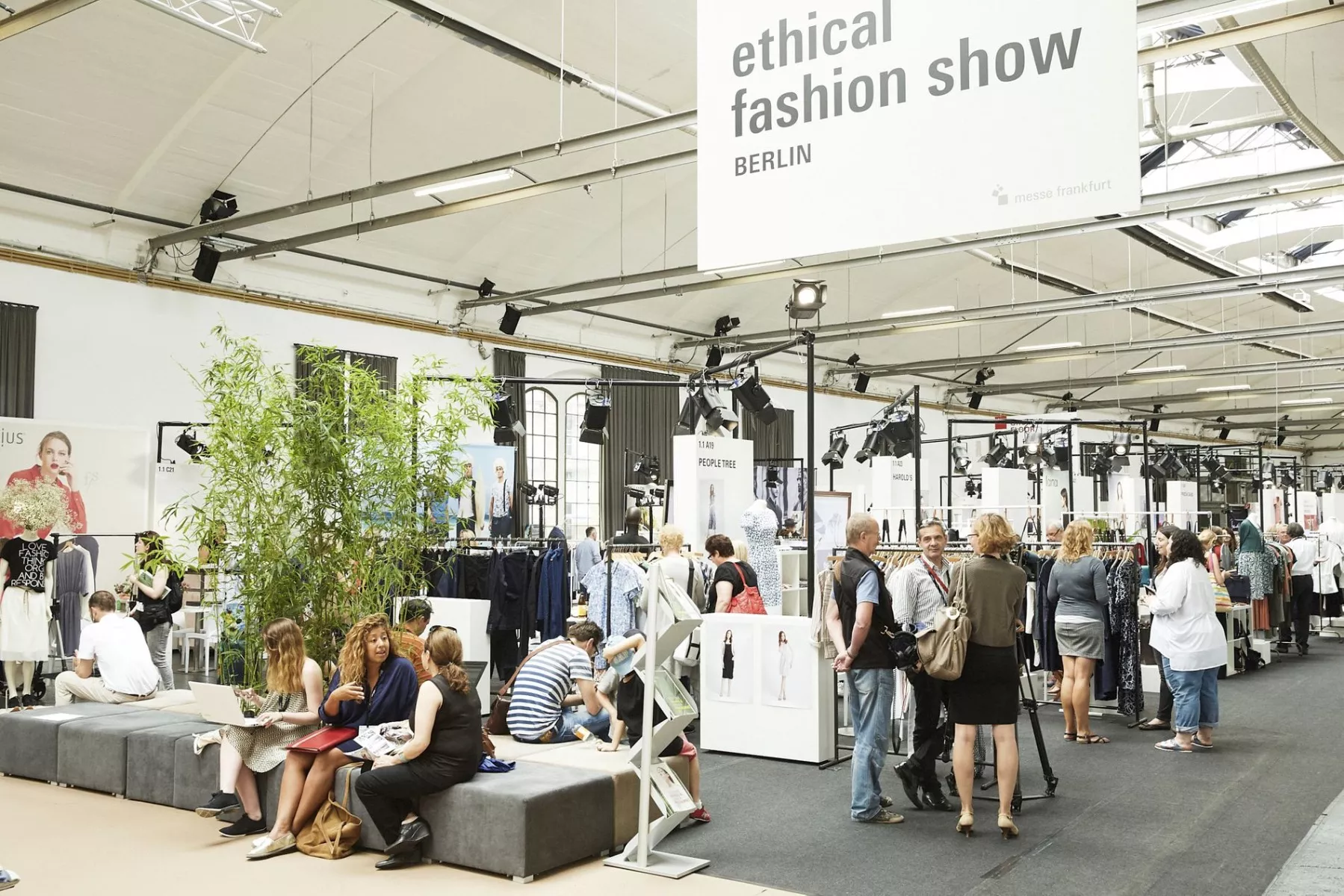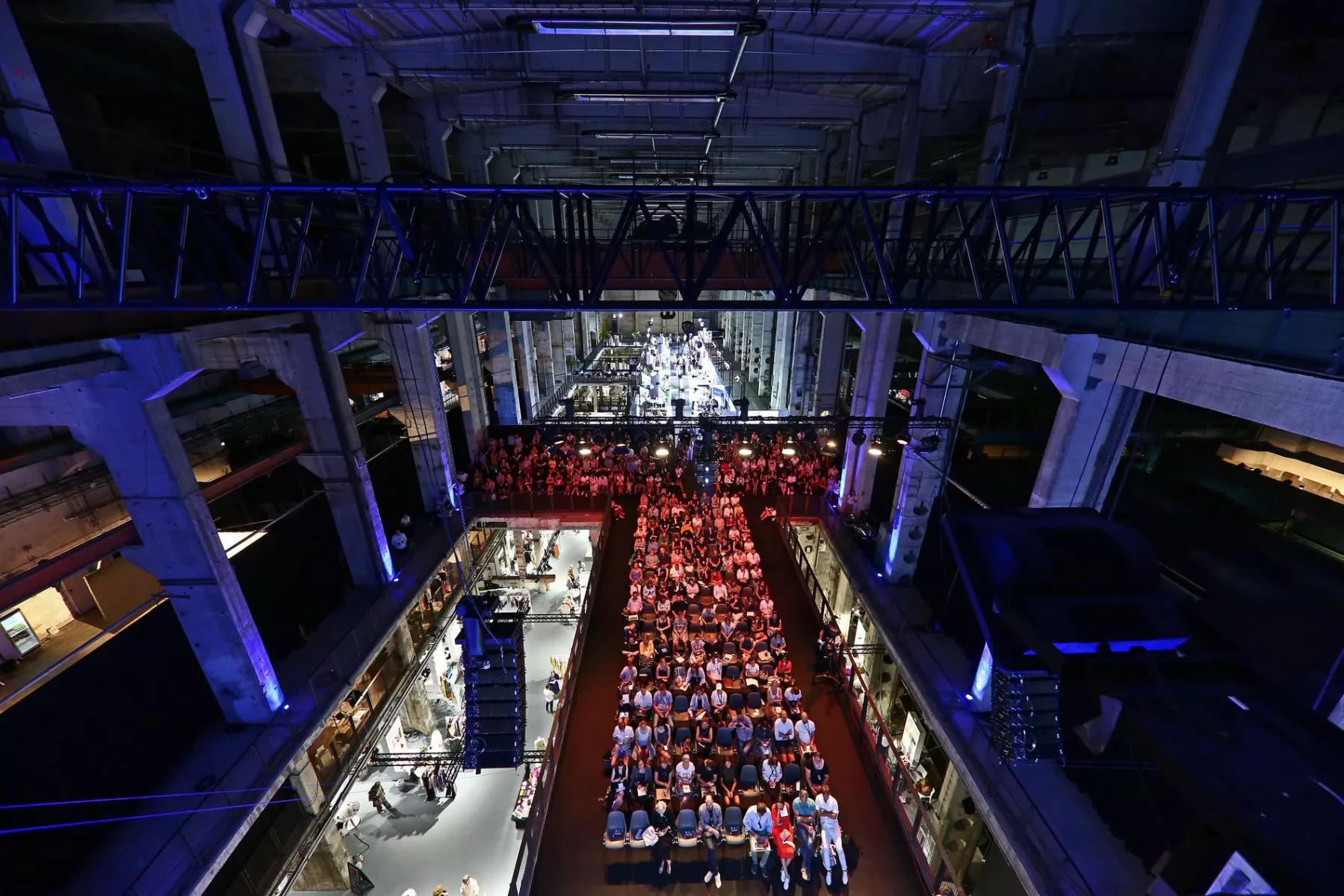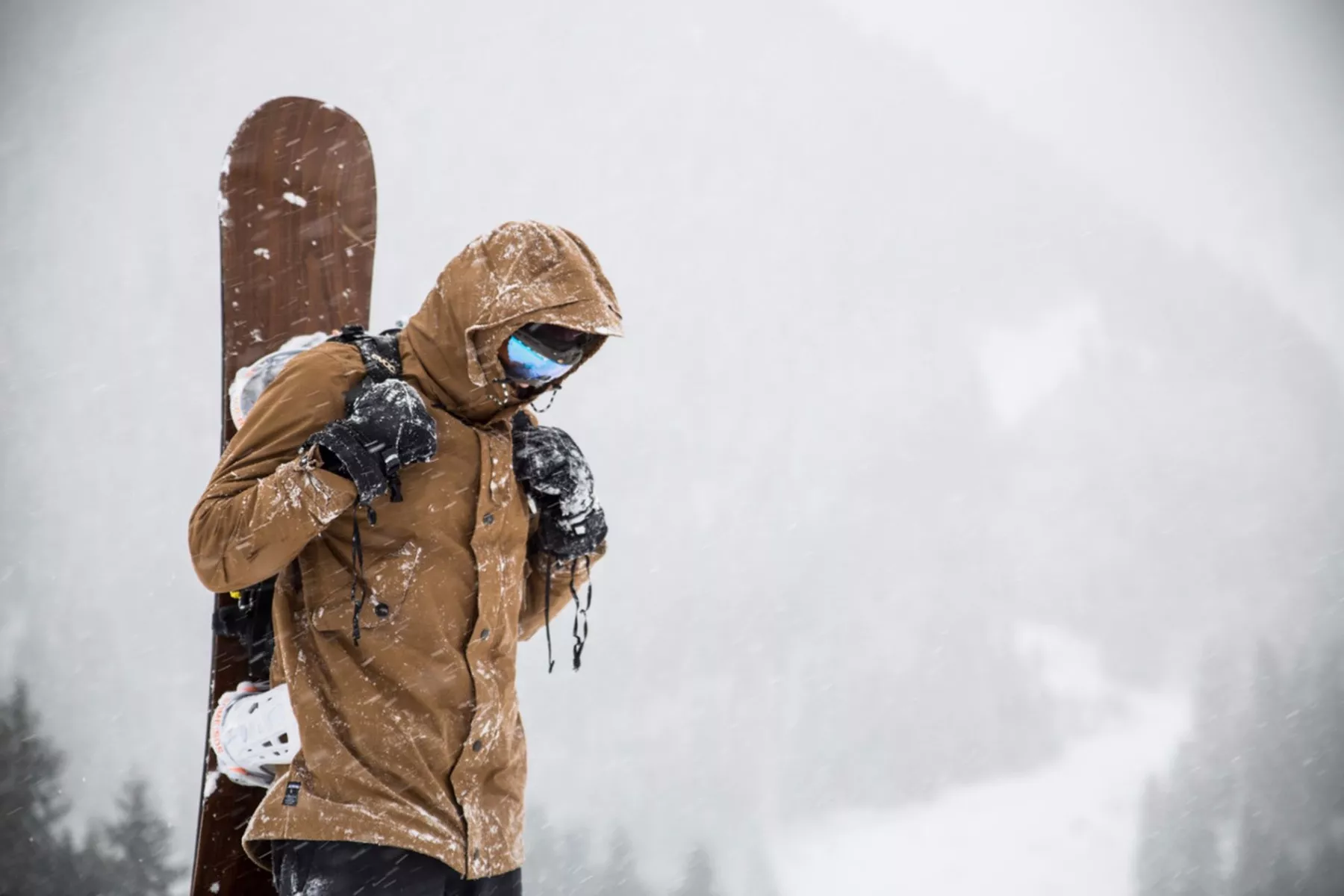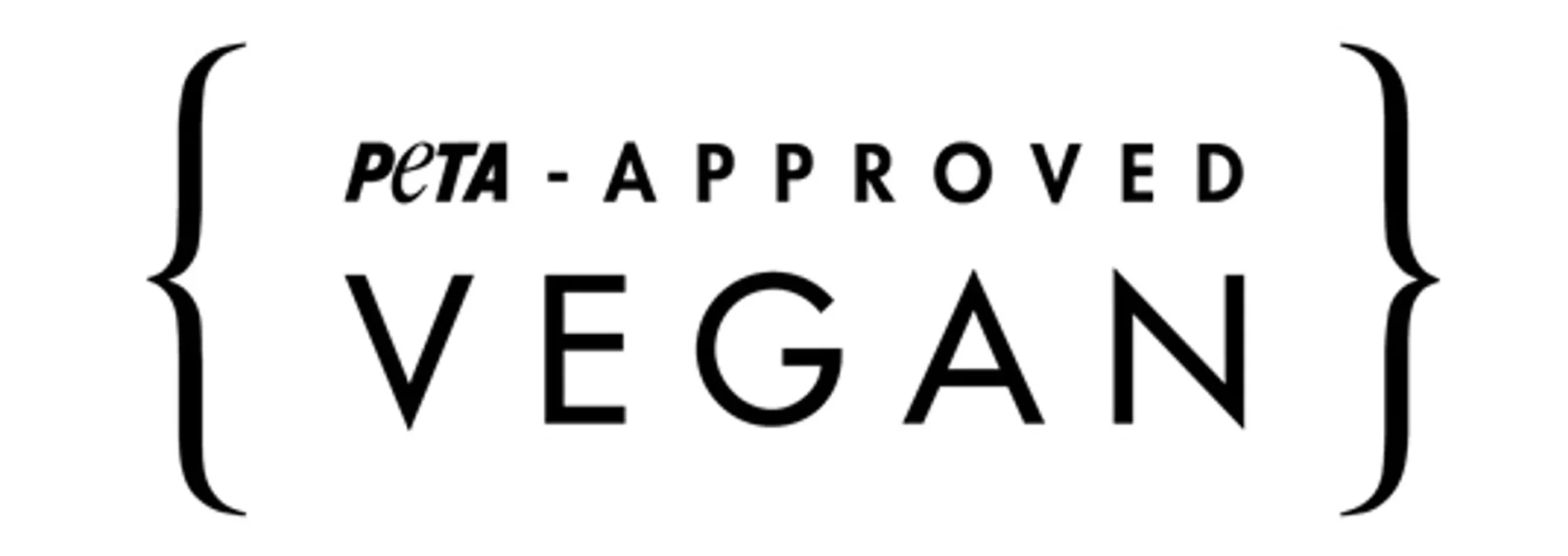Get 10% off and be the first
to discover new brands!
Parking my bike outside the Ethical Fashion Show, part of Berlin Fashion Week, I notice the line stretching out the gate, containing a mix of fashionistas, corporate professionals and a few more regular looking types. I brush off the anxiety of fitting into the latter category, along with the tyre spray from the back of my bright red, second-hand ski jacket.
Just after 10am the production line of people is fed into the entrance. Moving through the impressive, industrial concrete maze that is Kraftwerk Berlin, I feel in awe of its vastness. The building itself was once a power plant before being recycled into an event space in the heart of Berlin. On the top floor I find the cafe. After the initial disappointment of discovering they sell soy milk in favour of the more sustainable oat variety, the barista revives my optimism by handing me a reusable plastic beaker, for which I pay a one euro deposit.

EFS Berlin Day One - Hosted By Fashion Tech Berlin
Day one of the conference is hosted by Fashion Tech Berlin, with a mix guest speakers from top fashion brands and tech-savvy companies giving their outlook on how to switch from fast fashion to a more sustainable direction. The first talk is presented by LYST, a global fashion search platform that brings high-end brands to the online world. With the mention of dresses retailing at twenty eight thousand Euros and delivery drivers that serve champagne, I begin to wonder if LYST were booked by mistake.

Sustainable Clothing From The Trade Floor
I leave the talk early, venturing into the jungle of ethical fashion sprawled throughout the three story building, keeping my eyes peeled for boardsports, outdoor gear and anything inspirational. I quickly come across AMOV, a sustainable apparel brand with on-point outdoor jackets. Kasper, the CEO and founder tells me about the ethical supply chain and their focus on durability and traceable cataloging of garments.
My next encounter is with JeckyBeng, an urban outwear brand based out of Bavaria that focuses on quality materials and transparency. The sales manager, Thomas tells me about the in house industry expertise behind the high performance fabrics, while demonstrating the impermeability of their ultra-tight, Japanese inspired organic cotton weave - the camp stool made of this material holding a pool of water without any leakage whatsoever. The label also produces a range of interesting and bespoke outdoor items such organic surf wax and survival gear.

Feeling hungry for more inspiration, I use the lunch break to check out a label well known for spearheading the movement towards the use of eco-friendly materials. Vaude’s eye catching display of outdoor gear is almost as impressive as the enthusiastic and knowledgeable sales rep. The latest collection, she informs me, combines style with functionality, providing consumers with multi use ethically produced outdoor gear.
Vaude actively engineers and tests new materials in their own laboratories and collaborates with leading fibre innovators such as Lenzing. For example, their new range of multipurpose urban ski-jackets feature Tencel fibre fleecing - which is organically and sustainably produced, fully biodegradable, more absorbent than cotton, softer than silk and cooler than linen.
The Conference Heats Up With Hot Topics
Back to in the conference, the room is kept warm, despite the cavernous feel of the building, thanks to the lights that shine brightly upon the well dressed delegates in the front row. I join The Digital Leader’s Mindset talk, addressed by Hartman Consultants. Christopher Hartman, managing partner, outlines the need for a digital philosophy to be addressed at board level, rather than policy being led by auxiliary departments.
‘Every company is a startup now’ Christopher reflects, referencing the rapid change within digital commerce, ‘to ensure business success, it is vital that a flexible opportunity over survival mindset is adopted.’
As the day progresses the talks become more engaging from an ethics standpoint. Brock Cardiner, editor director of Highsnobiety EU gives his take on how innovative fabrics are shaping the fashion landscape. The pioneering fashion, arts and culture blog brings over one hundred pieces of content per day to their followers through their various social media channels.
Brock highlights the growing trend towards automation in fashion and the role it plays in improving efficiency, quality control and working standards, before stressing the need to constantly develop new high-performance fabrics.
But why not make do with what we already have? Brock compares the struggle for ever more technical fabrics with the current demand for SUV vehicles. Most people don’t need an SUV to get around the city, but it’s cool to own one. The same goes for fashion. You may own the latest high performance sportswear but not necessarily push it to its limit. But popularising new smart-fabrics helps leverage change and drive improvements in technology and performance.
One of the latest players to enter the performance apparel industry, I am surprised to hear, is Red Bull. Ahmet Mercan, head of global consumer products, introduces the audience to AlphaTauri as it’s new General Manager. Red Bull, under the guise of AlphaTauri, aims to be a leader in the innovative, smart-tech fabric industry. ‘One of our biggest challenges,’ Ahmet reveals, ‘is how to make high performance technology invisible, yet cost effective.’
The last talk of the day, Kick-starting An Eco-centric Mindset is presented by Oliver Kann and Rune Orloff, co-founders of Sardin, a new global e-commerce platform. It kicks off with a tough truth; fashion is the second most polluting industry in the world after oil, with the overconsumption of water and chemicals, overproduction and ocean contamination being the most damaging factors.
‘Everybody has a responsibility when it comes to the environment,’ the audience is told, ‘change begins with individual responsibility,’ as we at The Fair Cottage believe, ‘and is galvanized through collaboration, collectivity and purposeful direction.’
The message is clear. If enough people start taking responsibility for the environmental impact of their actions, then the movement will gain momentum and change will naturally occur, ultimately creating an industry that holds no distinction between sustainable fashion and the old idea of what fashion is.
But first, people need access to goods and services, the talk concludes, that fit in with people’s ethical lifestyle choices. So how does one set about launching an eco-centric business that contributes towards a shift in consciousness? Crowdfunding, kickstarter campaigns and (we are pleased to here) inspired web shops are noted as effective ways to get the needle threaded and moving.
A Last Look At Fashion Transparency
Just before heading out the door I get the chance to meet Marc Solterbeck, managing director of Ethletic, a truly transparent, super cool vegan sneaker brand. He tells me how each part of the trainers they design, from the sole to the laces through to the tiny eyelets, are sourced ethically and sustainably. Furthermore, the entire production process is subject to rigorous testing to ensure they adhere to their high ethical standards, and of course, they are PETA approved vegan.

For more on Ethical Fashion Show Berlin check out part 2 of this article.
If you have any suggestions, questions or want to offer some in-kind assistance that could help grow the the project, or if you are interested in partnering or collaborating with The Fair Cottage, we would be delighted to hear from you.
You can also join our conscious network and contribute towards change by signing up to our mailing list.


